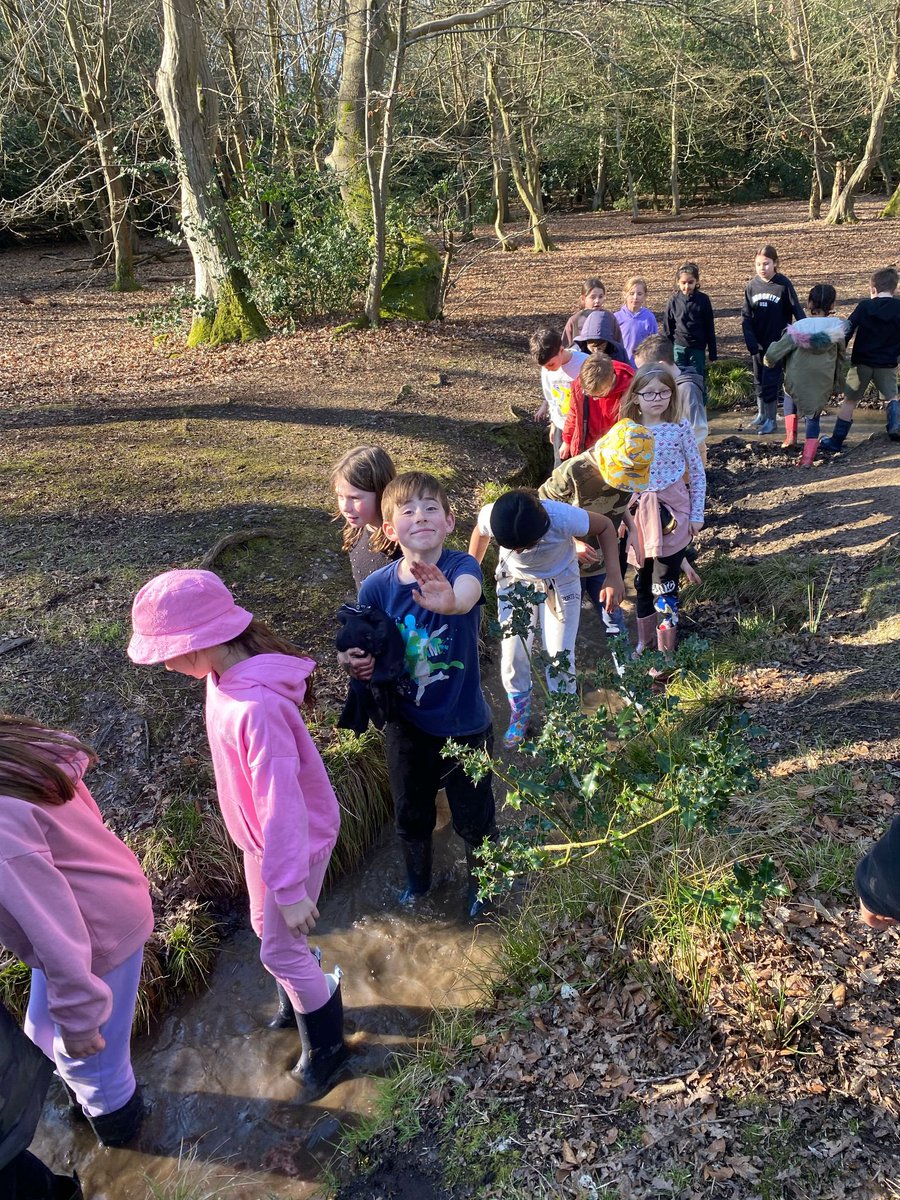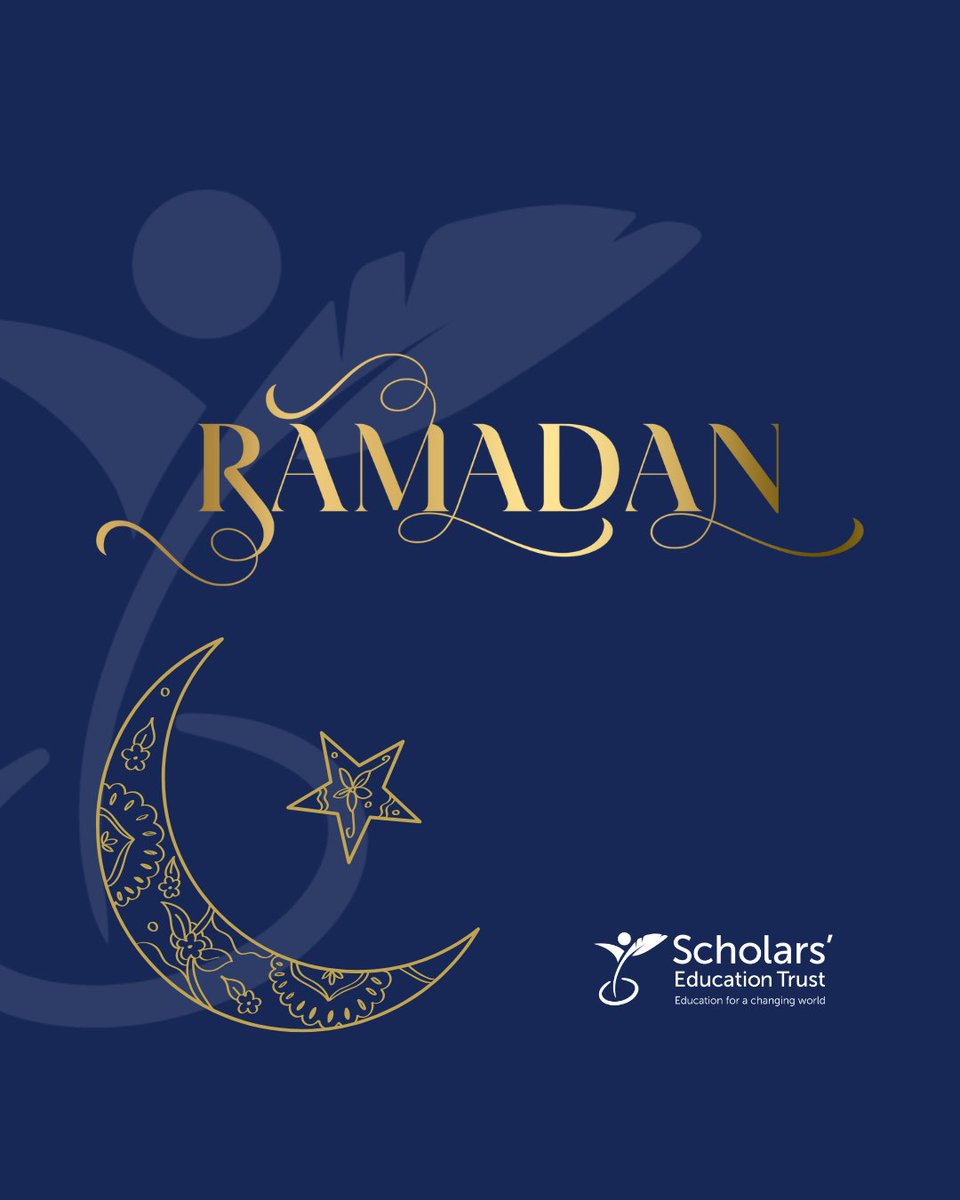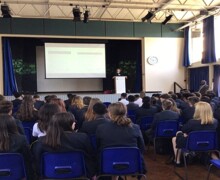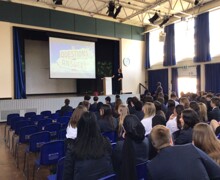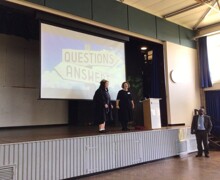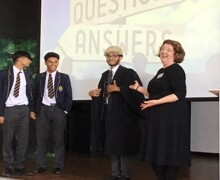Religion and Society
Religion and Society at Samuel Ryder Academy develops students’ knowledge and understanding of religious beliefs and practices as well as exploring moral debates whilst taking into consideration spiritual, moral, social and cultural development. Alongside this, students cover PSHE (Personal, Social, Health and Economic) education which equips children with the knowledge and skills necessary for students to live healthy, safe, productive, fulfilled, capable and responsible lives.
Through up-to-date resources, outside agencies, challenging and engaging projects students learn about the six major world religions, ethical issues that people face in life and British values.
All students express their beliefs and ideas through written, creative and spoken communication. We are dedicated to ensuring that our students leave the Academy with the skills and knowledge to enable them to play a vital role in their communities and to embrace a modern and diverse world.
KS1
As the children progress through Key Stage 1 they will be learning about three of the major religion’s studied in RE. They will understand the foundation of Christianity, Judaism and build on that knowledge throughout the year. In Year 2, they will be extending their knowledge on Christianity and Judaism and then be introduced to Islam and understand the foundation, this will progress throughout the primary phase and the children will have experience of a wide range of knowledge leading to develop their higher order thinking and given the opportunity to reflect back on prior knowledge. Throughout the Key Stage the children will have many opportunities to develop their oracy skills and have discussion about the similarities and differences between the religions.
|
Year group |
Autumn 1 |
Autumn 2 |
Spring 1 |
Spring 2 |
Summer 1 |
Summer 2 |
|
Year 1 |
Religion: Christianity Theme: Creation Story |
Religion: Christianity Theme: Christmas |
Religion: Christianity Theme: Jesus as a friend |
Religion: Christianity Theme: Easter- Palm Sunday |
Religion: Judaism Theme: Shabbat |
Religion: Judaism Theme: Rosh Hashanah & Yom Kippur |
|
Year 2
|
Religion: Christianity Theme: Jesus' Teachings |
Religion: Christianity Theme: Christmas- Jesus as a gift |
Religion: Islam Theme: Prayer at home |
Religion: Christianity Theme: Easter- Resurrection |
Religion: Judaism Theme: The Covenant |
Religion: Islam Theme: Hajj |
KS2
Building on their Key Stage 1 knowledge, the children will be further enhancing their knowledge in all other religions. In Key Stage 2, the children have the opportunity to use their oracy skills and their high order thinking skills to carry out class discussions and debates demonstrating the similarities and difference within the religions. In Key Stage 2, the children learn about more specific parts of the religions, this then gives them a real insight to the religion.
|
Year group |
Autumn 1 |
Autumn 2 |
Spring 1 |
Spring 2 |
Summer 1 |
Summer 2 |
|
Year 3 |
Religion: Hinduism Theme: Divali |
Religion: Christianity Theme: Christmas |
Religion: Christianity Theme: Jesus' Miracles |
Religion: Christianity Theme: Easter-Forgiveness |
Religion: Hinduism Theme: Hindu Beliefs |
Religion: Sikhism Theme: Prayer and worship |
|
Year 4 |
Religion: Buddhism Theme: Buddha's Teachings |
Religion: Christianity Theme: Christmas |
Religion: Judaism Theme: Passover |
Religion: Christianity Theme: Easter |
Religion: Buddhism Theme: The 8-fold path |
Religion: Christianity Theme: Prayer and Worship |
|
Year 5 |
Religion: Hinduism Theme: Prayer and Worship |
Religion: Christianity Theme: Christmas |
Religion: Sikhism Theme: Beliefs and moral values |
Religion: Christianity Theme: Easter |
Religion: Sikhism Theme: Prayer and Worship |
Religion: Christianity Theme: Beliefs and practices |
|
Year 6 |
Religion: Islam Theme: Beliefs and Practices |
Religion: Christianity Theme: Christmas |
Religion: Christianity Theme: Beliefs and Meaning |
Religion: Christianity Theme: Easter |
Religion: Islam Theme: Beliefs and moral values |
Religion: Christianity Theme: Covenant |
KS3
Key stage 3 continues the development of religious literacy through religions and world view. This permeates through this programme of study by building on personal and critical responses. Students make connections and reflect upon different features of the religions, investigate, interpret and respond to a range of beliefs, practices and symbols. Learners also explore their identity, their role within the community and identify the characteristics of responsible citizens.
In Year 7, we start with investigating the concept of ‘Identity’, exploring uniqueness, the need to belong to a community and treating people with respect and tolerance. Students then study the founders and leaders of the six main world religions, their key teachings and places of worship. Students finish the year with a creative project Faith in Action where students delve into finding out how belief drives positive change in the world.
Year 8 has a greater focus on philosophy and ethics, exploring the big questions such as arguments for and against the existence of God and the problem of evil, with a specific focus on the Holocaust. Students then investigate prejudice and discrimination, challenging common stereotypes and injustices in societies. Students explore wellbeing and investigate approaches for looking after our mental health with links to substance misuse.
In Year 9, students are encouraged to apply their knowledge and skills to topics such as Relationships & Families and Crime & Punishment. Students further examine the law through lessons on drug use. The topic of moral issues is always popular as students enjoy expressing their views and learning about alternative ones through looking at recent case studies for example animal testing, euthanasia and organ donation. While the main focus is Christianity, links are made to other world religions as well as humanism and atheism.
KS4
In Year 10 and 11 students undertake the full AQA Religious Studies GCSE course. This includes studying the Christian and Islamic religions and their beliefs and practices. Students then apply this knowledge to four themes: -
- Religion and Life looking at religion and science and life after death
- Religion Families and Relationships looking at marriage and divorce
- Religion and Crime and Punishment looking at the aims of punishment and the death penalty
- Religion Peace and Conflict looking at the issues surrounding war and the importance of peace.
There are two exam papers at the end of the course that give an overall grade. Alongside this, all students have one lesson a week where they are able to further enhance their personal skills. We cover topics such as personal finance, careers, and medical ethics. Students are encouraged to develop greater self-awareness of their own qualities and attitudes that helps them in their future personal and career development.
Beyond GCSE
We offer A-Level Religious Studies: Philosophy and Ethics. The GCSE is designed to lead into the A-Level and therefore students will be well equipped to take the subject.
Topics covered in this course
The course is split into three main components:
- Philosophy of Religion:
- Ancient Greek philosophical influences
- Arguments about the existence or nonexistence of God
- The problem of evil
- The nature of the soul, mind and body
- The possibility of life after death
- Religion and Ethics:
- Ethical theories
- The application of ethical theories
- Contemporary issues such as business ethics and sexual ethics
- Debates surrounding the significant ideas of conscience and free will
- Developments in religious thought:
- Students will study either Christianity or Islam to A-Level standard, building on the foundational knowledge and skills from GCSE
Student suitability for course
Students are required to achieve a grade 5 or above at GCSE to be suitable to take Philosophy and Ethics at A-Level.
Wider Curriculum Opportunities and Careers
As part of our extra-curricular provision, students join our popular debating club open to all secondary phase students. Current topics are debated in a professional and respectful environment. Year 7 students also enjoy our humanities cross-curricular trip into St Albans; including fieldwork in Verulamium Park and a visit to the Cathedral. Sixth Form students undertake a visit to the Houses of Parliament to gain an insight in to the United Kingdom political system. SCHOLAR in RS - there are a variety of ways to embed SCHOLAR in RS lessons for example oracy is regularly used throughout lessons, developing leadership skills and curiosity in the world. Study of Religious Education can lead in to a whole range of careers and degrees; Law, Medicine, Philosophy, Education, Journalism, the Armed Forces, and Business.
Examples of work in RS
Year 8 tackling philosophical questions through debate
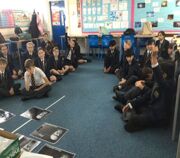
Sixth form working in groups showcasing research skills
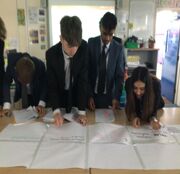
Year 7 identity T shirts as part of the topic who am I?
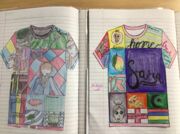
Year 9 Religion, Environmental and Animal Welfare
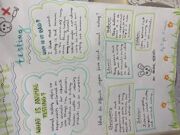
Technology in RS
RS provides plenty of opportunities for the use of technology in the classroom and outside of school. Apps such as Seesaw, OneNote and Kahoot are used regularly in lessons. Students are encouraged to use various apps and technologies in their home-learning assignments and for revision with more emphasis on choice than ever before.
Useful Links
AQA Specification A
www.aqa.org.uk/subjects/religious-studies/gcse/religious-studies-a-8062
https://www.ocr.org.uk/qualifications/as-and-a-level/religious-studies-h173-h573-from-2016/















